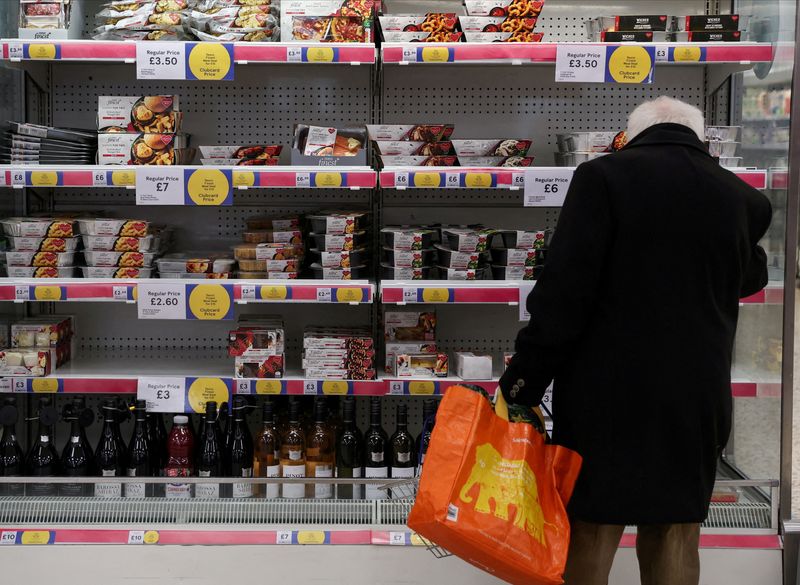By James Davey and Sarah Young
LONDON (Reuters) -British supermarket executives rejected allegations they were profiteering through a cost of living crisis on Tuesday, telling lawmakers they had taken a hit to profit by not passing onto consumers the full force of pricing pressures they face.
Food prices started rising well over a year ago, as Russia's invasion of Ukraine compounded pandemic-related tensions in supply chains.
Britain had the highest rate of food price inflation in Western Europe during the 12 months to May at 18.7%, according to official data. Over a longer time frame - since late 2021 - only food prices in Germany have risen by more.
Soaring food prices have contributed to the biggest squeeze on living standards in Britain since records began in the 1950s, and prompted questions about who is responsible.
Trade unions and politicians have accused the supermarkets of "greedflation", saying they've been too slow in passing on to consumers falls in global commodity prices.
Executives from market leader Tesco (OTC:TSCDY), Sainsbury's, Asda and Morrisons, appearing in front of the lower house of parliament's business and trade committee, rejected this charge, saying their profits fell last year.
"We make 4 pence in every pound which I don't think is any example of profiteering," Tesco commercial director Gordon Gafa said.
Rhian Bartlett, Sainsbury's commercial director, said her firm made less than 3 pence in every pound customers' spend, while Asda's chief commercial director Kris Comerford said a 25% slump in 2022 profit wasn't consistent with profiteering.
The British Retail Consortium, which represents the major supermarkets, has said there is usually a three to nine months lag for falls in wholesale prices to be reflected in retail prices, with the more complex the supply chain the longer the lag.
Separately on Tuesday, Bank of England policymaker Swati Dhingra said there was little evidence of companies failing to pass on lower producer prices so far.
"It's not very convincing to argue - at least as of yet - that grocery inflation is driven by 'greedflation'," she said.
The supermarkets say they are passing on savings to customers as soon as they can and most have recently cut the prices of some staple products.
However, prices for milk, cheese and eggs are still up 27.4% versus last year, while oils and fats are up 22.6%, according to official data.
PRICE CAPS
Earlier this month, the French government secured a pledge from 75 top food companies to cut prices on hundreds of products. Hungary's government has also imposed mandatory price cuts.
The UK executives said price caps weren't needed.
"We're generally considered one of the most competitive food markets in the world. I'm not sure what price caps would add to that process, other than bureaucracy," said Sainsbury's Bartlett.
She said the market "self regulates to a positive extent," while Morrisons CEO David Potts said: "Competition leads you to the right place."
The executives said on top of higher energy costs they were also having to juggle rising wage bills and logistics costs. At the same time, they face brutal competition from German discount groups Aldi and Lidi, which have gained market share in Britain in the last decade.
EXPLAINER-Why is UK food inflation so stubbornly high?
